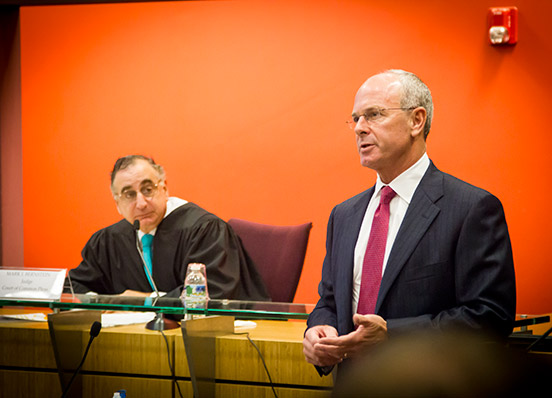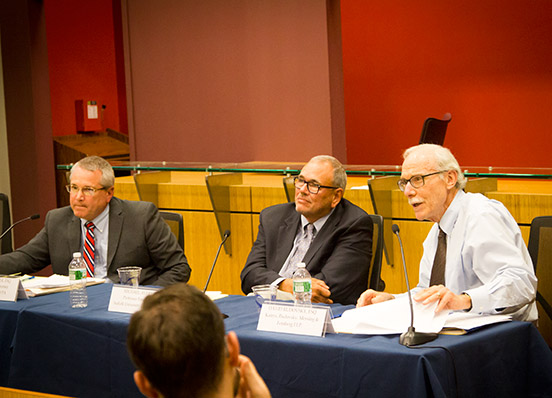Leading attorneys and jurists explored the complex and changing role of expert witnesses during a daylong Drexel Law Review symposium at the Kline School of Law on Oct. 10.
The symposium touched on the admissibility of communications between attorneys and experts, distinctions between hearsay and inadmissible evidence underlying an expert opinion, the role of forensic science in criminal cases and qualities that make a strong expert witness.
“The use of expert witnesses is ubiquitous in the law,” said Professor David DeMatteo, who organized the symposium with Professor Gwen Roseman Stern. “Statistics suggest that most attorneys at some point in their careers will have a need to hire or confront a witness.”
Sessions focused on the impact of the landmark Pennsylvania Supreme Court ruling in Barrick v. Holy Spirit Hospital and the controversy surrounding Rule 703 of the Federal Rules of Evidence featured an innovative format, in which Kline & Specter partner Andrew J. Stern squared off against O’Brien & Ryan partner Elizabeth Duffy in hearings involving a simulated medical malpractice case over which Judge Mark I. Bernstein of the First Judicial District of Pennsylvania presided. (Complete program and speaker biographies.)
Stern argued that correspondence between an attorney and an expert witness was discoverable, citing unusual circumstances including the disappearance of a nurse who could not be cross examined and who left no written record of observations that allegedly led the defendant physician to discharge a patient from the hospital in the simulated case.

Duffy countered that “the Barrick court concluded there’s a bright line rule” protecting communications between counsel and experts, and that only a case asserting bad faith might warrant an exception.
Stern and Duffy also grappled with the basis of expert opinions allowed under Rule 703. While Duffy said experts commonly base opinions on inadmissible evidence such as a nurse’s undocumented remarks to a doctor, Stern argued that the expert in this case was asserting hearsay as a fact that would likely prejudice a jury against a brain-dead plaintiff who could not speak for himself.
While a jury can determine the credibility of a hearsay statement, Bernstein agreed that Rule 703 is problematic, since it implies that information can be introduced as the basis for an expert opinion without implicitly asserting its truth.
Gregory Cowhey, a McGladrey principal who has testified in myriad fraud and business cases said the hallmarks of a good expert witness are an engaging personality, credibility and humility. However, it is easier for a good advocate to damage the credibility of expert witnesses on the stand than it is to get them disqualified from testifying, Cowhey said, citing studies that document the low rate of successful challenges in most jurisdictions.
A panel featuring Cowhey, DeMatteo, psychologist Gerald Cooke and Judge Elizabeth T. Hey, a U.S. Magistrate in the Eastern District of Pennsylvania, focused on the roles and responsibilities of witnesses. Although few rules governed the conduct of expert witnesses 30 years ago, there are vast volumes of ethical codes and guidelines today, Cowhey said. Serving as an expert witness introduces distinct ethical concerns, Cooke and DeMatteo said, noting the responsibilities of psychologists in legal proceedings are different than for clinicians treating patients. Hey discussed shifts that have occurred in information that the courts require experts and attorneys to disclose.
The symposium closed with a panel focused on the role of the confrontation clause with regard to forensic science, featuring criminal defense experts Michael Avery and David Rudovsky and Assistant U.S. Attorney David Troyer of the Eastern District of Pennsylvania.

In the Supreme Court’s Melendez-Diaz and Bullcoming cases, Avery said, the majority held that relying on testimony by laboratory analysts who did not directly handle evidence violates the defendant’s right to be confronted with opposing witnesses.
Avery said, however, that the Supreme Court has yet to definitively decide what to do when an analyst who conducts a forensic study is unavailable to testify and the state wants to call a substitute witness who offers an independent view of the evidence. In Massachusetts, he added, the court has permitted substitutes to testify if they voice an independent position.
That may leave them vulnerable to defense challenges, Rudovsky, said, since a substitute analyst won’t know if the primary analyst handled materials and equipment correctly. A criminal defense attorney needs to know more about forensic science than the expert witness does.
“You have to know exactly what the science is whether you’re questioning the original or the substitute analyst,” Rudovsky said. “You won’t know where the flaws are unless you understand the science.”
When confronted with an unavailable forensic analyst, the U.S. Attorney’s Office has materials retested, Troyer said. If no samples are available to retest, the case is dismissed, he said.
Troyer said U.S. Supreme Court Justice Sotomayor’s concurring opinion in Bullcoming outlined topics that were not at issue in the case, which suggests that a different outcome is possible in the future.
“That’s a message to all you trial lawyers,” Troyer said, “’Next time, raise this issue, and we might decide it differently.’”